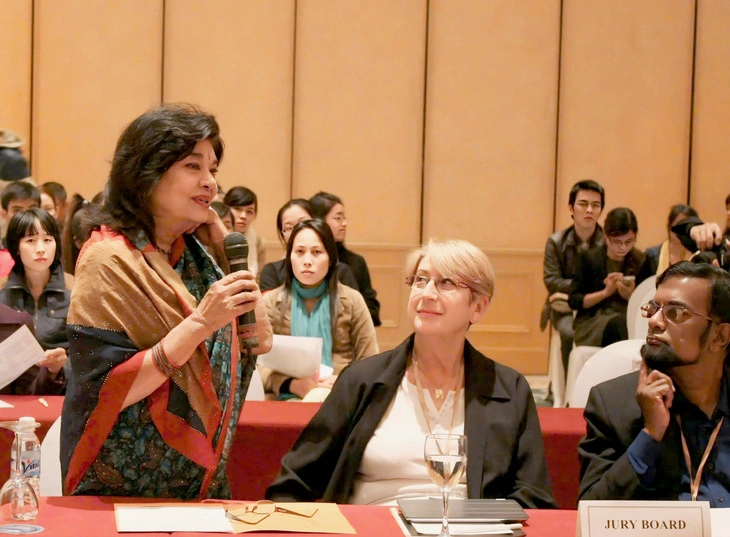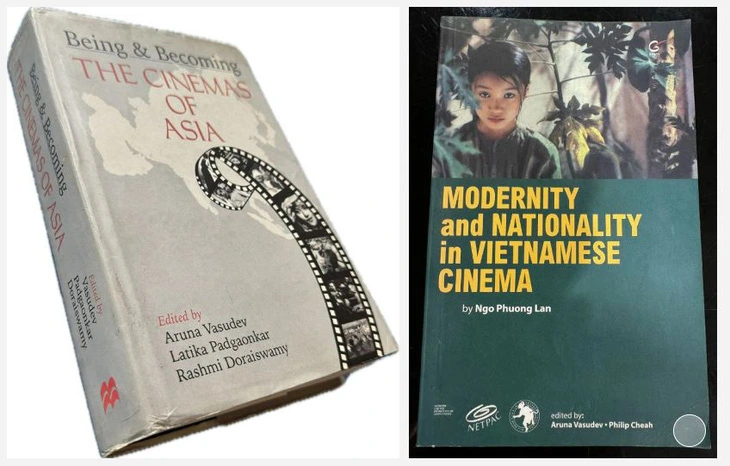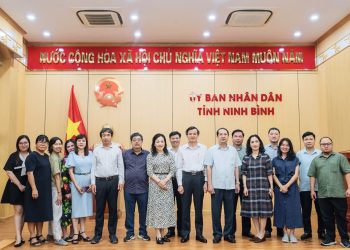Renowned film critic Aruna Vasudev is a name beloved and respected by filmmakers and film advocates across the globe.

I received the news of her passing in the early hours of September 6, instantly drowned under a wave of shock, sorrow, and emptiness.
Vasudev is truly gone, a sentiment still hard to believe, even though she was frail with age and had been suffering from Alzheimer’s for years.
With her departure, Asian cinema has lost an irreplaceable figure — one who may not find a successor for a long time.
Aruna: The soul of NETPAC
Aruna Vasudev was known as a critic, editor, author, documentary filmmaker, and ‘an eminent scholar of Asian cinema’ as some newspapers put it.
She began studying photography in New York in the early 1960s, later producing several documentaries before moving to France to pursue film studies, and eventually earning her PhD in 1979 from Sorbonne University in Paris.

In 1988, she launched Cinemaya, a rare magazine dedicated to reviewing new films, profiling renowned and emerging filmmakers, and covering Asian film festivals and cinema events.
In 1991, Vasudev founded the Network for the Promotion of Asian Cinema (NETPAC), a non-profit professional organization of Asian and international film advocates under the auspices of UNESCO.
It aims to discover and honor Asian films and filmmakers while fostering the exchange of academic issues of Asian cinema.
She visited the Hanoi International Film Festival twice as a jury president for NETPAC and as a keynote speaker on Vietnamese cinema’s reform. Indeed, she was the heart and soul of the NETPAC awards since their inception, and she became the centerpiece of many cinematic events.
I was fortunate to meet her early in my career, at the second Fukuoka Film Festival in 1992, where, as a young critic, I had been invited to speak at a panel on Vietnamese cinema. That year, Vietnamese films were chosen to be the Fukuoka Film Festival’s focus. I was so focused on my speech that I became unaware of the presence of top Asian and international filmmakers in the audience, in that auditorium of over 100 people.
After I finished my presentation, many came up to congratulate me. Among them was Vasudev, a strikingly elegant middle-aged Indian woman with a warm voice, who looked at me attentively with a kind smile.
She asked me for my thoughts on the new wave of Vietnamese cinema, about directors like Dang Nhat Minh, and other emerging Vietnamese filmmakers. She walked away from me that event leaving assurances that she would commission me to write for Cinemaya. A while later, I received her letter requesting an article.
If it were not for Vasudev and Cinemaya, my name would not appear on the pages of magazines and books on Asian cinema. More importantly, my career as a film critic might have remained confined to Vietnam’s borders, or perhaps I would have settled as a diligent civil servant at the Department of Cinema.
I wrote for Cinemaya about Vietnamese documentaries as ‘historical witnesses,’ the wave of reformed films by second-generation Vietnamese directors, specifically directors Dang Nhat Minh (Thuong Nho Dong Que) or Le Hoang (Ai Xuoi Van Ly), and Ho Quang Minh (Thoi Xa Vang). Each article I submitted was welcomed and encouraged by Vasudev.

She who loved Vietnam wholeheartedly
Vietnam was undoubtedly one of the countries that Vasudev held dear, and Vietnamese cinema always had a special place in her heart.
In early 2000, she invited me to contribute a chapter on Vietnamese cinema to her book ‘Being & Becoming – the Cinema of Asia’ (Macmillan, 2002). After I submitted my work, I was puzzled when my chapter was titled A Time to Die, A Time to Live. Upon reflection, it made perfect sense. No other country had endured such prolonged war and destruction before emerging into a peaceful life.
Seeing my chapter on Vietnamese cinema in a monumental 600-page book filled me with emotion and happiness.
Vasudev, as NETPAC’s president, also encouraged me to complete the manuscript of a book that would later be published by NETPAC.
As a result, my book entitled ‘Tinh Hien Dai Va Tinh Dan Toc Trong Dien Anh Viet Nam’ or ‘Modernity and National Identity in Vietnamese Cinema’ in English was meticulously edited by Vasudev and fellow critic Philip Cheah, director of the Singapore International Film Festival for two decades, before being published internationally in 2007.

Memories of love, tireless dedication
I became a member of NETPAC quite early, and it has been almost thirty years now. Being a member granted me precious time with Vasudev and I have cherished every moment, especially when I was a jury member at film festivals or attended international conferences.
One memory stands out vividly. I had been invited to New Delhi as a jury member for the Osian’s Cinefan Film Festival, founded and chaired by Vasudev. After the closing ceremony, I rushed to the airport but became so absorbed in reading screenplays that I missed my flight. With no other option, I headed back to my hotel.
The next morning, Vasudev came to pick me up and spent the entire day with me. After losing her husband early in life, she lived with her older sister, a well-known journalist and writer, and her only daughter, Inca.
“Inca recently got married. Her husband is the grandson of former Prime Minister Indira Gandhi. They were classmates,” Vasudev proudly shared with me during one of her trips to Hanoi.
Another memory of Vasudev is the feasts she would host after each film event. She would invite all her friends and NETPAC members to her home, and we would be there late into the night.
Stories of career, as well as passion and ambition for cinema, were ignited by Vasudev for Asian filmmakers and her unwavering efforts helped shape the growth and spread of Asian cinema over the past decades.
She truly was the ‘Mother of Asian Cinema,’ not just the title of a film about her, but a fitting description in every sense. I am fortunate and honored to be one of her ‘children.’
NETPAC currently presents its NETPAC Award at nearly 50 international film festivals, including prestigious ones like Berlin, Venice, Rotterdam, Singapore, Toronto, Busan, and more.
In Vietnam, the NETPAC Award is given at the Hanoi International Film Festival (HANIFF) and the Da Nang Asian Film Festival (DANAFF).
Aruna Vasudev has been recognized with numerous awards, including the Korean Cinema Award at the Busan International Film Festival in 1997; the Lifetime Achievement Award at the Cinemanila International Film Festival in 2006; the Lifetime Achievement Award at the International Film Festival of Colombo in 2015; the Vision in Film Award at the Hawaii International Film Festival in 2015, to name a few.
In 2019, she received the French honor of ‘Officier de l’Ordre des Arts et des Lettres’ (Officer of the Order of Arts and Letters) for her outstanding contribution to cinema and the arts.
The Tripoli Film Festival has even named its Best Screenplay award after her, the ‘Aruna Vasudev Award.’
Editor’s note: This article was originally written in Vietnamese by Dr. Ngo Phuong Lan, chairwoman of the Vietnam Film Development Association, in tribute to the late Indian film critic Aruna Vasudev. It has been translated and edited by Tuoi Tre News.














